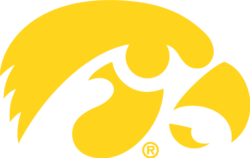By DARREN MILLER
hawkeyesports.com
IOWA CITY, Iowa — Butch Caldwell seemingly had it all.
The dual-threat quarterback from Dayton, Ohio, possessed a strong throwing arm, legs that could zig-zag around defenders, and a durability to thrive in the 1970s when the sport was, well, hard-hitting, hammering football.
 Yes, Caldwell seemingly had it all. He had the fame that comes with being most valuable player on the 1976 University of Iowa football team, a recognition derived from 616 passing yards, three passing touchdowns, 389 rushing yards, and four more scores on the ground.
Yes, Caldwell seemingly had it all. He had the fame that comes with being most valuable player on the 1976 University of Iowa football team, a recognition derived from 616 passing yards, three passing touchdowns, 389 rushing yards, and four more scores on the ground.
But Caldwell lacked one thing. It was absent in the spring of 1977 when he should have walked across the stage at commencement, and it remained missing until May 16, 2020. That is the day Caldwell will receive a diploma in communication studies with a minor in television and film production — 43 years after his original expected graduation date.
“This is very rewarding,” Caldwell said. “I had tears in my eyes. This makes me appreciate what I didn’t appreciate before. It is gratifying, and I was looking forward to going across that stage.”
Because of the coronavirus pandemic, Caldwell will not get to clutch his diploma, shake hands with an academic dignitary, or pose for photos on stage in cap and gown. Always the optimist, he looks at it as another brush with history.
“I was one of the first African-American quarterbacks to start at a major university,” he said. “And I’m in the first class to graduate that didn’t get to march because of the coronavirus. I will make history again.”
In Caldwell’s first tour as a University of Iowa student-athlete from 1972-77, he pursued a degree in general studies, which did not require a foreign language. Iowa no longer offers that degree, so in order to major in communication studies, Caldwell needed to complete an additional 35 semester hours — including four Spanish courses. He will take two Spanish classes this summer before he officially has a degree.
Things have evolved in academia since Caldwell enrolled at Iowa in 1972.
“I feel like Fred Flintstone visiting George Jetson,” he said.

%20--%3e%3csvg%20xmlns:inkpad='http://taptrix.com/inkpad/svg_extensions'%20height='231pt'%20xmlns:xlink='http://www.w3.org/1999/xlink'%20xmlns='http://www.w3.org/2000/svg'%20width='796pt'%20version='1.1'%20viewBox='0,0,796,231'%3e%3cdefs/%3e%3cg%20id='Untitled'%20inkpad:layerName='Untitled'%3e%3cpath%20d='M102.252+48.3067L83.5399+48.3067L83.5399+182.202L102.252+182.202L102.252+230.822L-0.0490809+230.822L-0.0490809+182.202L18.6626+182.202L18.6626+48.3067L-0.0490809+48.3067L-0.0490809+0.300613L102.252+0.300613L102.252+48.3067ZM239.828+230.822L165.748+230.822C138.908+230.822+121.27+213.184+121.27+184.35L121.27+46.773C121.27+18.092+139.215+0.300602+165.748+0.300602L239.828+0.300602C266.669+0.300602+284.307+18.2454+284.307+46.773L284.307+184.35C284.307+213.031+266.362+230.822+239.828+230.822ZM218.816+182.356L218.816+48.4601L186.607+48.4601L186.607+182.356L218.816+182.356ZM313.448+48.3067L297.037+48.3067L297.037+0.300613L394.123+0.300613L394.123+48.6135L375.718+48.6135L392.282+159.503L426.945+0.300613L476.025+0.300613L512.834+159.503L526.178+48.6135L509.307+48.6135L509.307+0.300613L605.166+0.300613L605.166+48.6135L589.368+48.6135L560.534+231.129L482.313+231.129L451.945+95.0859L420.963+230.822L345.81+230.822L313.448+48.3067ZM588.141+182.356L605.779+182.356L640.902+0.300613L745.656+0.300613L780.166+182.356L796.577+182.356L796.577+230.975L718.356+230.975L710.994+174.687L672.19+174.687L665.288+230.975L588.601+230.975L588.141+182.356L588.141+182.356ZM706.853+132.509L691.975+39.4111L676.638+132.509L706.853+132.509Z'%20opacity='1'%20fill='%23ffcd00'/%3e%3c/g%3e%3c/svg%3e)
